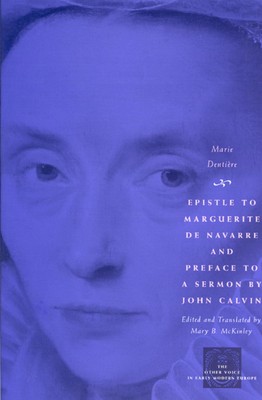
- We will send in 10–14 business days.
- Author: Marie Dentière
- Publisher: University of Chicago Press
- ISBN-10: 0226142795
- ISBN-13: 9780226142791
- Format: 15.5 x 23 x 1.2 cm, softcover
- Language: English
- SAVE -10% with code: EXTRA
Epistle to Marguerite de Navarre and Preface to a Sermon by John Calvin (e-book) (used book) | bookbook.eu
Reviews
Description
Born to a noble family in Tournai, Marie Dentière (1495-1561) left her convent in the 1520s to work for religious reform. She married a former priest and with her husband went to Switzerland, where she was active in the Reformation's takeover of Geneva.
Dentière's Very Useful Epistle (1539) is the first explicit statement of reformed theology by a woman to appear in French. Addressed to Queen Marguerite of Navarre, sister of the French king Francis I, the Epistle asks the queen to help those persecuted for their religious beliefs. Dentière offers a stirring defense of women and asserts their right to teach the word of God in public. She defends John Calvin against his enemies and attacks the hierarchy of the Roman Catholic Church. Her Preface (1561) to one of Calvin's sermons criticizes immodesty and extravagance in clothing and warns the faithful to be vigilant. Undaunted in the face of suppression and ridicule, this outspoken woman persisted as an active voice in the Reformation.
EXTRA 10 % discount with code: EXTRA
The promotion ends in 11d.19:43:57
The discount code is valid when purchasing from 10 €. Discounts do not stack.
- Author: Marie Dentière
- Publisher: University of Chicago Press
- ISBN-10: 0226142795
- ISBN-13: 9780226142791
- Format: 15.5 x 23 x 1.2 cm, softcover
- Language: English English
Born to a noble family in Tournai, Marie Dentière (1495-1561) left her convent in the 1520s to work for religious reform. She married a former priest and with her husband went to Switzerland, where she was active in the Reformation's takeover of Geneva.
Dentière's Very Useful Epistle (1539) is the first explicit statement of reformed theology by a woman to appear in French. Addressed to Queen Marguerite of Navarre, sister of the French king Francis I, the Epistle asks the queen to help those persecuted for their religious beliefs. Dentière offers a stirring defense of women and asserts their right to teach the word of God in public. She defends John Calvin against his enemies and attacks the hierarchy of the Roman Catholic Church. Her Preface (1561) to one of Calvin's sermons criticizes immodesty and extravagance in clothing and warns the faithful to be vigilant. Undaunted in the face of suppression and ridicule, this outspoken woman persisted as an active voice in the Reformation.


Reviews